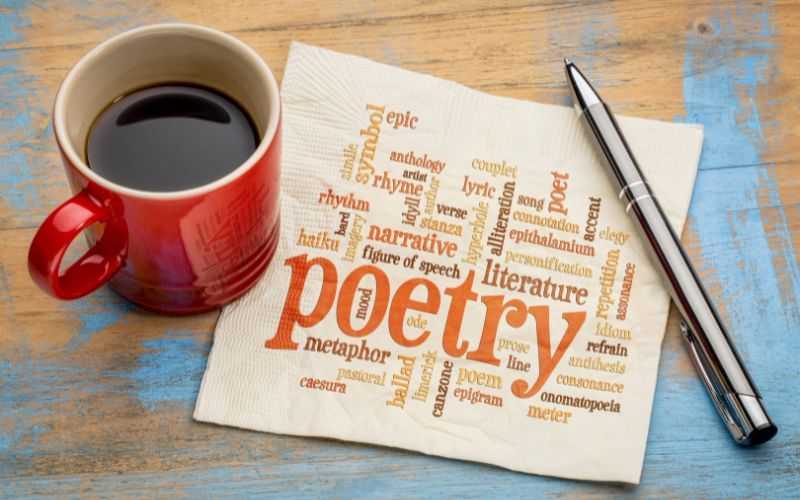How to get your child interested in poetry


Ah, poetry, beautiful poetry! Poetry helps us understand the world around us while exploring our emotions in a captivating way. It certainly holds its own distinctive power.
Whether you’re interested in getting your child to read or write poetry, there are numerous benefits to introducing this form of writing to them. Poetry will be all around them: be it in children’s poetry books they will encounter or simply through the songs they hear on the radio.
So, how does one introduce poetry to children? How do they start writing poems, themselves? What kind of poetry is the best to start with? Poetry is varied and comes in many different shades of colour!

Firstly, you can start introducing poems to your child that you can read together. Perhaps they can read a favourite poem out loud. We’ve all grown up with beautiful works of poetry like Shel Silverstein’s “A Light in the Attic”, or A. A. Milne’s, “The Complete Poems of Winnie the Pooh”. Sometimes, the best way to start is by selecting the works yourself. If you’re stuck with where to start, online resources like the Poetry Foundation also have endless examples of poetry for children.
Examples of different types of poetry to introduce to your child
Haiku
A famous style of Japanese poetry. Haiku champions a famous format of 5 – 7 – 5. This simply means that the poet writes words that have 5 syllables for the first line, 7 syllables for the second and 5 for the third. Given its limited framework, this style of poem is great to introduce to your younger children (and a blast for the older ones, as well). To make the introduction easier, you might want to ask them to do words instead of syllable count.
Rhyming Couplet
What’s in a name? Rhyming couplet poems have words that rhyme! If your little ones are having trouble identifying words that rhyme, you can remind them that words that rhyme normally end in the same letters. The rhyming lines don’t have to be one after the other, they can have other lines in between.
You can also start with your child writing a list of words that rhyme! It all starts with sounding words out and then figuring out how to link them in a couplet.
Concrete
Introducing a visual element to your children’s poetry adds some valuable texture to help them become engaged in the poem. Concrete poetry allows children to have fun with the visual appearance of their lines. For instance, a diamante poem is in the shape of a diamond!
There are plenty of Concrete Poetry generators online, but perhaps you can provide your child with a shape for them to write into.
Lyric
It’s all in the songwriting! Lyrics have been around since the dawn of time. To introduce lyric writing, you simply start with listening! Or perhaps, you can start by having a sing-a-long of your child’s favourite song.
Then have them write down the lyrics to start understanding the framework of lyric.
Acrostic
An acrostic poem is a poem where certain letters in each line spell out a word or phrase. Typically, the first letters of each line are used to spell the message. You can start by having your child write an acrostic poem of their name!
Tips and tricks
Introduce your child to a thesaurus
A thesaurus is a book that lists words in groups of synonyms. If you don’t have a thesaurus handy at home, Thesaurus.com is a wonderful resource to introduce to your children.
Buy fridge magnets
This is an easy way to incorporate poetry into daily routine – right in your kitchen. You can play a game with your children getting them to match up words that rhyme!
Go on long walks
Poetry is all around us! As you go for walks with your child, ask them to identify things that they might want to write about. For instance, if it’s winter, you can ask them to write a poem about snow!
Whatever way you decide to introduce poetry to your child, keep their interests in mind. There are loads of poems out there about every subject! If you find the right poem, you’ll open up a brand new world of opportunity for your child to start loving poetry.
How Night Zookeeper can help
Our writing curriculum teaches and encourages writing poetry along with many other genres. Your child can get started on their writing journey with Night Zookeeper's reading & writing program today.
Sign up and get a FREE 7-day trial!
Got any questions? Email us at support@nightzookeeper.com. Follow us on social media:


Make Reading & Writing Fantastically Fun!
- Award-winning reading & writing program for kids
- Improves spelling, grammar, punctuation & vocabulary
- Over 1,000 different learning games and activities


“My child hates writing.” What do I do?


25 Creative Writing Prompts for Kids


